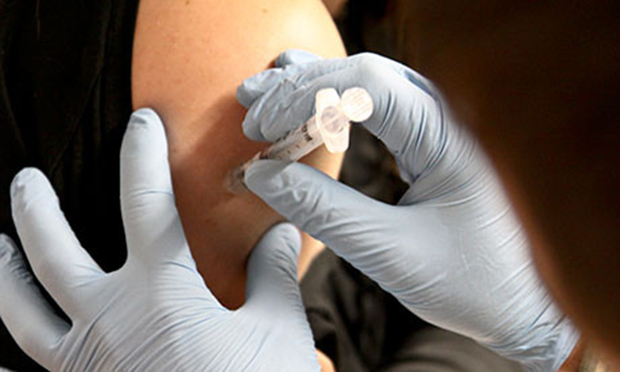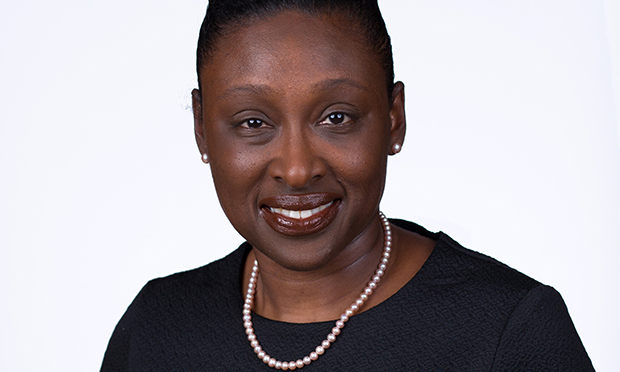Covid vaccine: Low uptake in Hackney as roll-out met with ‘strong resistance’

Local medics are tackling “strong resistance” in Hackney to the uptake of the Covid vaccine, with the latest data suggesting a high proportion of people are declining or deferring the jab, against a backdrop of low trust in authority and misinformation.
While “the jury is still out” on what percentage of the whole population would have to have the vaccine to stop the infection spreading, according to public health director Dr Sandra Husbands the current thinking is around 80 per cent.
Husbands pointed to professionals aiming for 70 per cent uptake of a flu vaccine, and over 95 per cent for highly-infectious measles.
According to an NHS briefing, 63 per cent of Hackney patients aged over 80, 65 per cent aged between 75-79, and 54 per cent of those aged 70-74 or classed as clinically vulnerable have been vaccinated.
Richard Bull, primary care group director for Hackney and the City of London, said: “We’re still working to the national deadline of having cohorts 1-4 vaccinated by the end of this week. Last night we heard on the news that there are still a missing two million. There is a higher proportion in City & Hackney, and that is due to people declining or deferring.
“There are still a lot of people who have not made their mind up yet about wanting the vaccine.
“This data changes on a daily basis. The latest data available to us is from 6 February and at the end of last week and all through this week it has been incredibly busy. There’s still a lot of activity going on, so we do expect these numbers to improve, though we do recognise there is still strong resistance out there with people deferring and declining.”
NHS figures show that 12,546 patients out of 21,020 patients in the top four priority groups registered with City & Hackney have now been vaccinated, with data showing that hesitancy across the general population is down to a number of factors including mistrust in the government and politicians.
Other factors listed in the report include a desire to wait to see how it affects others first, a lack of certainty over whether the vaccine is safe, and concerns about side effects if the jab was rushed, and its implications for other health conditions.
Housebound patients are set to be vaccinated by 14 February, though according to Bull a “fair proportion” of this group are also declining.
Nearly 1,300 registered patients have turned down a vaccine to date.

Photograph: Hackney Council
According to Healthwatch Hackney director Jon Williams, local misinformation continues to be an issue, with his organisation recently flagging a WhatsApp message circulating false claims that the vaccine can be activated to give people Covid at a later date.
A meeting of NHS professionals, politicians and voluntary sector leaders focused today on the sense of mistrust among Hackney’s Black or Black British residents, 40 per cent of whom are unsure about getting the vaccine. Eighteen per cent will definitely not get it, according to NHS data, compared to 9.4 per cent and 2.4 per cent for white British residents.
The meeting of City & Hackney’s local outbreak board heard warnings that a lack of uptake could deepen structural inequality and contribute to stigmatising ethnic minority communities, with both council and NHS leaders pledging to “listen to what the community is telling us”.
Hackney’s Deputy Mayor Anntoinette Bramble said: “This is built on years of mistrust. We are working against that at a local level, to reassure people using local people like Dr Husbands and from the community to reassure people around why it is safe to take the vaccine.
“You have to remember that Black people and people from an ethnic minority are disproportionately affected by so many negative statistics in society – you cannot be surprised that they might think that if they take the vaccine that they would be disproportionately affected by this vaccine.
“While we are talking about our community, across the country it is not just Black communities, white communities have these insecurities and that is playing out elsewhere as well. We’re talking about our community, but it is playing out in other communities too, and at a local level, everyone has to try their best to combat that, because I don’t think many people trust national government on this.
“My concern is that if there is not a high uptake within the Black and other ethnic minority communities it is another way they are stigmatised, another way they can potentially be blamed – ‘it’s their fault they’re not taking it, it’s their fault the virus is spreading.’ So, we’re listening. We want to relay your issues and your fears and we are taking that time.”
Jake Ferguson of non-profit organisation Hackney CVS underlined that, while a specific event for African and Caribbean heritage people is being held next Thursday, more long-term conversations are needed to address mistrust.
Not all listening saw the low uptake as cause for concern, with Dr Haren Patel, the CCG’s clinical lead for medicines management, reassuring listeners that people will gradually change their minds “after they see their friends who have had it and they are well and alive”. He predicts that Hackney’s numbers will slowly catch up with national rates.
A community vaccination event for people from the Charedi community is due to take place this Saturday 13 February between 8.30pm and midnight to accommodate religious worship at the John Scott vaccination centre.
Dr Sandra Husbands answered some of the most common questions from residents on the coronavirus vaccine – you can read them here
You can keep up to date with the coronavirus vaccination roll out in Hackney on Hackney Council’s website.
- If you’ve been invited to receive the vaccine, residents are advised to book their appointment as soon as possible.
- If you’re over 80 and haven’t been contacted, you should speak to your GP.
- If you’re an unpaid carer, make sure you are registered as a carer with your GP.
- Be aware of scams – the vaccine is only available for free on the NHS
- Make sure any information you share about the vaccine comes from a trusted source such as www.nhs.uk/coronavirus
You can watch a walkthrough video of the John Scott vaccination centre
EDIT: This article was updated at 07:06 on Friday 12 February 2021.

Credulous fools.